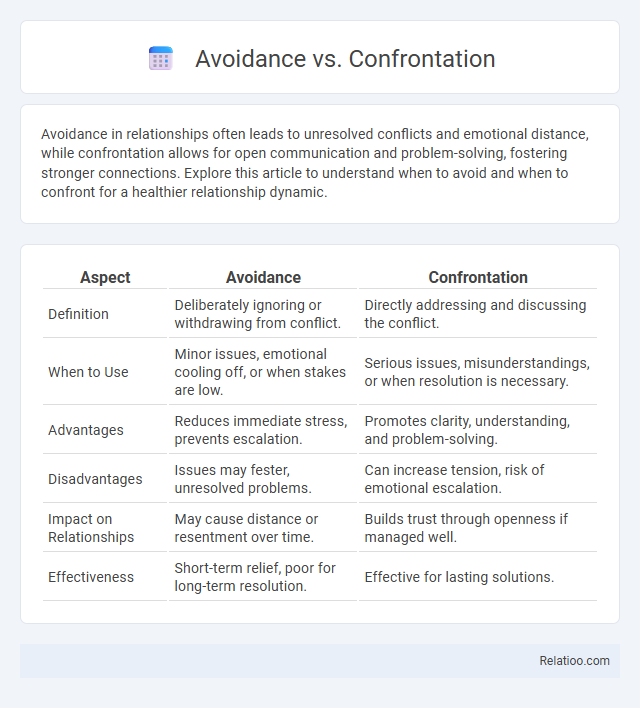Avoidance in relationships often leads to unresolved conflicts and emotional distance, while confrontation allows for open communication and problem-solving, fostering stronger connections. Explore this article to understand when to avoid and when to confront for a healthier relationship dynamic.
Table of Comparison
| Aspect | Avoidance | Confrontation |
|---|---|---|
| Definition | Deliberately ignoring or withdrawing from conflict. | Directly addressing and discussing the conflict. |
| When to Use | Minor issues, emotional cooling off, or when stakes are low. | Serious issues, misunderstandings, or when resolution is necessary. |
| Advantages | Reduces immediate stress, prevents escalation. | Promotes clarity, understanding, and problem-solving. |
| Disadvantages | Issues may fester, unresolved problems. | Can increase tension, risk of emotional escalation. |
| Impact on Relationships | May cause distance or resentment over time. | Builds trust through openness if managed well. |
| Effectiveness | Short-term relief, poor for long-term resolution. | Effective for lasting solutions. |
Understanding Avoidance and Confrontation
Understanding avoidance and confrontation involves recognizing their roles in managing conflict and stress; avoidance entails deliberately ignoring or withdrawing from a problem to minimize immediate discomfort, often leading to unresolved issues and increased anxiety over time. In contrast, confrontation actively addresses conflicts or challenges through direct communication or problem-solving, promoting resolution and personal growth but sometimes risking escalation or emotional distress. Effective emotional intelligence requires balancing these strategies by assessing when avoidance preserves mental health and when confrontation is necessary for constructive outcomes.
Psychological Roots of Avoidance
Avoidance behavior often stems from deep psychological roots such as fear of failure, anxiety, or unresolved trauma, causing You to steer clear of challenging situations to protect your emotional well-being. This defense mechanism can temporarily reduce stress but may also hinder personal growth and problem-solving abilities. Understanding the psychological basis of avoidance helps differentiate it from confrontation, which involves directly addressing issues, and escapism, which diverts attention away from reality.
Why People Choose Confrontation
People choose confrontation because it often leads to direct resolution of conflicts, fostering personal growth and clearer communication. Facing issues head-on allows you to assert your needs and maintain boundaries effectively, which can prevent unresolved tension and stress. Confrontation promotes a sense of control and empowerment compared to avoidance or escapism, which may temporarily reduce discomfort but often prolong underlying problems.
Benefits of Avoidance in Conflict
Avoidance in conflict management can provide significant benefits by preventing escalation and allowing emotions to cool, creating space for clearer thinking. Your ability to step back from confrontation reduces immediate stress and preserves relationships when issues are minor or temporary. This strategic pause helps prioritize which conflicts truly require direct engagement, enhancing overall emotional well-being and decision-making.
Drawbacks of Avoidance Tactics
Avoidance tactics often lead to unresolved conflicts and increased stress, as problems remain unaddressed and can escalate over time. Your emotional well-being may be compromised due to persistent anxiety and the inability to develop effective coping skills. This approach limits personal growth and harmfully perpetuates a cycle of evasion that undermines healthy relationships and decision-making.
Strengths of Healthy Confrontation
Healthy confrontation enhances communication by encouraging open expression of feelings and concerns, fostering mutual understanding and trust. It promotes problem-solving through direct engagement, leading to effective resolution and personal growth. This approach builds resilience and assertiveness, empowering individuals to address conflicts constructively without escalating tension.
Risks and Downsides of Confrontation
Confrontation often leads to increased stress, damaged relationships, and prolonged conflict, which can negatively impact your mental and emotional well-being. It may escalate tensions, resulting in resistance or retaliation instead of resolution. Understanding these risks helps you approach disputes more strategically, balancing assertiveness with empathy to minimize harm.
Situational Factors: When to Avoid vs. Confront
Situational factors play a crucial role in determining whether avoidance, confrontation, or escapism is the best approach for resolving conflicts. You should avoid confrontation when the potential risks outweigh the benefits, such as in situations involving power imbalances or when emotions run too high for productive dialogue. Confronting is more effective when timely resolution is necessary and communication can be conducted respectfully to address core issues directly.
Building Skills for Assertive Communication
Avoidance, confrontation, and escapism represent different responses to conflict, but building skills for assertive communication empowers you to express your thoughts and feelings confidently and respectfully. Developing assertiveness helps in setting boundaries, reducing misunderstandings, and fostering healthier relationships without resorting to passive or aggressive behaviors. Practicing techniques such as using "I" statements and active listening enhances your ability to navigate disputes effectively.
Strategies for Balancing Avoidance and Confrontation
Balancing avoidance and confrontation involves recognizing when to engage with challenges and when to step back for emotional regulation, ensuring healthier conflict resolution. Your strategy should include assessing the situation's impact on your well-being and long-term goals, using avoidance to prevent unnecessary stress while employing confrontation to address critical issues directly. Developing self-awareness through mindfulness and communication skills enhances your ability to navigate conflicts effectively without defaulting to escapism.

Infographic: Avoidance vs Confrontation
 relatioo.com
relatioo.com